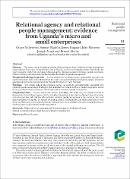| dc.contributor.author | Grace, Nalweyiso | |
| dc.contributor.author | Samuel, Mafabi | |
| dc.contributor.author | James, Kagaari | |
| dc.contributor.author | John, Munene | |
| dc.contributor.author | Joseph, Ntayi | |
| dc.contributor.author | Ernest, Abaho | |
| dc.date.accessioned | 2023-01-19T15:04:06Z | |
| dc.date.available | 2023-01-19T15:04:06Z | |
| dc.date.issued | 2022-08 | |
| dc.identifier.citation | Nalweyiso, G., Mafabi, S., Kagaari, J., Munene, J., Ntayi, J. and Abaho, E. (2022), "Relational agency and relational people management: evidence from Uganda’s micro and small enterprises", Asia Pacific Journal of Innovation and Entrepreneurship, Vol. 16 No. 1, pp. 51-68. https://doi.org/10.1108/APJIE-01-2022-0004 | en_US |
| dc.identifier.uri | https://doi.org/10.1108/APJIE-01-2022-0004 | |
| dc.identifier.uri | https://hdl.handle.net/20.500.12504/1165 | |
| dc.description.abstract | Purpose – This paper aims to investigate whether relational agency fosters relational people management
using evidence from micro and small enterprises in Uganda, an African developing country. Specifically, the
paper examines whether the individual relational agency dimensions (shared learning, mutual cooperation,
collective efficacy and interaction enablement) also affect relational people management.
Design/methodology/approach – A cross-sectional survey design using a quantitative approach was
used in this study. Data were collected from 241 micro and small enterprises in Uganda using a structured
questionnaire and were analysed using the Statistical Package for Social Scientists.
Findings – The results indicate that relational agency is positively and significantly associated with
relational people management. Findings further indicated that collective efficacy, mutual cooperation, shared
learning and interaction enablement individually matter in relational people management.
Originality/value – To the best of the authors’ knowledge, this study may be among the first to
demonstrate that relational agency and its individual dimensions (interaction enablement, shared learning,
mutual cooperation and collective efficacy) foster relational people management in the context of micro and
small enterprises of Uganda, an African developing country. Consequently, this study contributes to both
theory and literature via the cultural historical activity theory, hence, adding to the scant existing literature on
relational agency and relational people management. | en_US |
| dc.language.iso | en | en_US |
| dc.publisher | Asia Pacific Journal of Innovation and Entrepreneurship | en_US |
| dc.subject | Relational people management, | en_US |
| dc.subject | Relational agency, | en_US |
| dc.subject | Collective efficacy, | en_US |
| dc.subject | Mutual cooperation shared learning | en_US |
| dc.subject | Interaction enablement. | en_US |
| dc.title | Relational agency and relational people management: evidence from Uganda’s micro and small enterprises | en_US |
| dc.type | Article | en_US |

